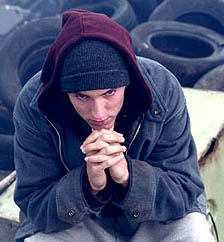"Ringleader of a Circus of Worthless Pawns":
Eminem and Class Rage
Warning: contains spoilers for 8 Mile
1. "Entertainment is changin'": Eminem in Hollywood
In his debut film, 8 Mile, Marshall Mathers Jr. has created another set of characters for himself. Add to Eminem, Slim Shady, et al, the names of Jimmy Smith Jr. and his own rap persona Bunny Rabbit - and perhaps the name of Eminem, Movie star. These new personae are neither as shocking nor as compelling as the earlier ones -- instead of dramatizing the more extreme elements of Mathers'personality, they try to soft-sell his pre-celebrity years - but they do serve to highlight what may be his most important contribution to our contemporary culture: the resurgence of class consciousness.
8 Mile isn't a great film. It feels too much like a social defence of Eminem -- he had a broken home, he loves his kid sister Lily, he is rhetorically homophobic but nice to the only gay man at the factory ("he's gay, but you're a faggot," he says to a rival rapper played by Xibit, as if trying to teach his critics what the F-word really means). But Eminem himself almost redeems it, with his mad eyes, understated presence, and remarkable restraint; Eminem is famous for his motormouth delivery, and he is on screen for most of the film, but he speaks surprisingly little.
Once he gets going, though, Eminem displays incredible command of language -- not just language, but language in time, down with the beat. In a music scene otherwise dominated by manufactured bands, meaningless trendies, or dance music, hip hop is, at heart, about lyrics and expression. Maybe the register isn't what we expect from our public speakers, but Eminem's ability to manipulate language in a visceral and emotive way is awe-inspiring and his control of rhythm, as with a huge number of other rappers of all colours, is truly phenomenal. And what he has to say is often worth listening to.
8 mile's plot is a trite Hollywood fable, in which we already know that the loser is going to make good (we know that Eminem has already made it even when Bunny Rabbit is struggling). The film is framed by two rap battles. In the first, Bunny Rabbit is still trying to win respect from the audience and gain confidence in himself. But when he gets up in front of a chanting, all-black audience and hears the insults of his opponent's rap, he falls silent and cannot speak . This silence haunts him. It is Jimmy's ability to articulate his situation that marks him out from the rest, that gives him hope of escaping the grim urban ghetto that has shaped him. But his ability, like his rage, only appears unpredictably in bitter fits, like some superpowered Tourette's syndrome.
The climax of 8 Mile is the second rap battle, a week later, with Bunny Rabbit now rapping in the championship battle against his nemesis Papa Doc. In his climactic, 1 1/2 minute rap, B. Rabbit takes all the criticisms that he knows are going to be levelled at him, levels them at himself, and says that despite them all he's still there and still fighting -- thus depriving his opponent of material. And then he goes on to dis Papa Doc, who Rabbit happens to know is otherwise known as Clarence, a privileged, middle class black kid who went to private school. In the face of this deliciously delivered knockdown, the tables are turned from the opening scenes, and Papa Doc is unable to respond.
So, it's not for its plot that 8 Mile is worth noting. What's interesting, and possibly even important, about the film is its treatment of class.



film politics music jay's head poetry art josh ring fysche saddies about archive
